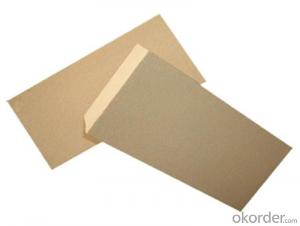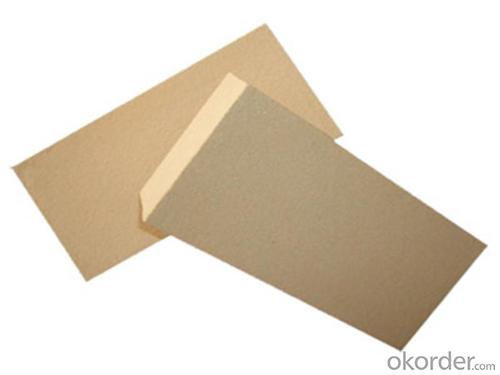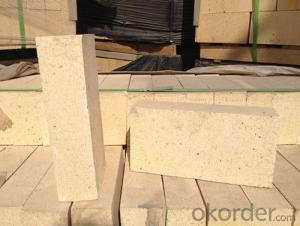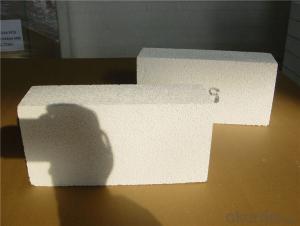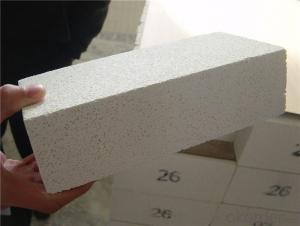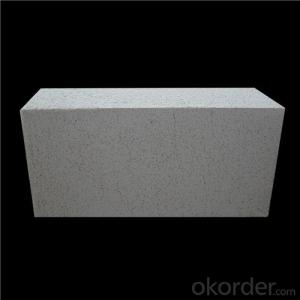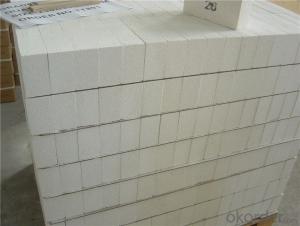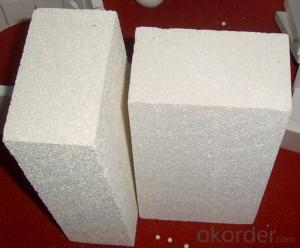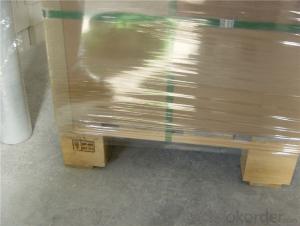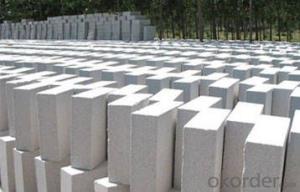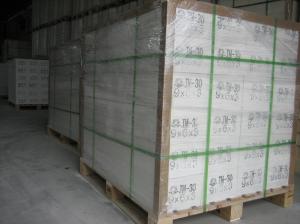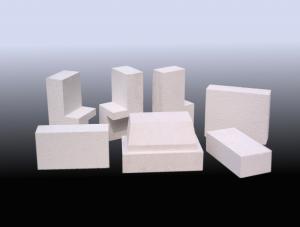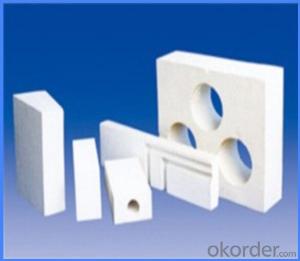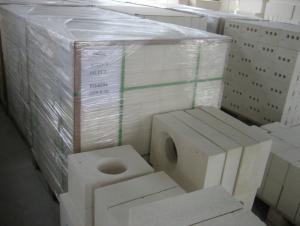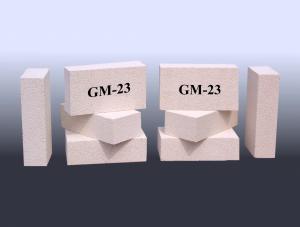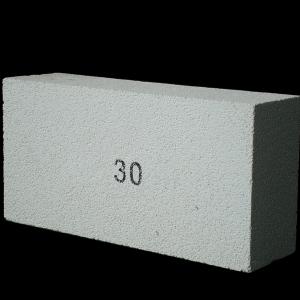Insulating Fire Brick - GJM Mullite Insulation Brick GJM-26
- Loading Port:
- Shanghai
- Payment Terms:
- TT OR LC
- Min Order Qty:
- 10 m.t.
- Supply Capability:
- 1000 m.t./month
OKorder Service Pledge
OKorder Financial Service
You Might Also Like
Specifications
mullite insulation brick
1. Low thermal conductivity
2.High hot compressive strength
3.Perfect Energy saving
Light weight mullite insulation furnace bricks refractory for sale
Advantage
1. Low thermal conductivity
2.High hot compressive strength
3.Perfect Energy saving
Description:
Lightweight mullite kiln bricks refractory for sale are made from good quality and superpure raw materials, with strictly classified fillings according to their grades. These fillings can form a uniform pore structure after burnt during the process of manufacture. Each grade of products has unique design to meet different thermal, physical and chomical demands.
Application:
Mullite insulation furnace bricks refractory material can be used in linings or heat-insulating materials of the industries, such as, ethylene pyrolysis furnaces, tubular furnaces, reforming furnaces of synthetic ammonia, gas generators and high-temperature shullte kilns, etc
Mullite Insulation furnace refractory material can be used as working lining, where contact with flames directly. This kind of brick can save the kiln energy very much
- Q: Can insulating fire bricks be used in tundish linings?
- Yes, insulating fire bricks can be used in tundish linings. Insulating fire bricks are made from lightweight refractory materials that have excellent insulating properties. Tundish linings are typically exposed to high temperatures and thermal shocks, which can lead to rapid wear and tear. By using insulating fire bricks, the tundish lining can be protected from excessive heat and thermal stresses. These bricks have low thermal conductivity, which helps to minimize heat loss and maintain a stable temperature inside the tundish. Additionally, insulating fire bricks have good mechanical strength and can withstand the mechanical stresses typically experienced in tundish operations. Overall, using insulating fire bricks in tundish linings can help to improve thermal efficiency, reduce energy consumption, and extend the service life of the tundish.
- Q: Can insulating fire bricks be used in the construction of glass fusing kilns?
- Yes, insulating fire bricks can be used in the construction of glass fusing kilns. These bricks have excellent insulating properties, which helps in maintaining consistent and controlled temperatures inside the kiln. Additionally, they can withstand high temperatures without cracking or breaking, making them suitable for glass fusing kilns.
- Q: Can insulating fire bricks be used in the construction of hearths?
- Yes, insulating fire bricks can be used in the construction of hearths. These bricks are designed to withstand high temperatures and provide excellent insulation, making them ideal for use in hearth construction. They help to retain heat and prevent the loss of energy, ensuring efficient and effective heating.
- Q: Can insulating fire bricks be used for high-temperature insulation?
- Absolutely, high-temperature insulation can be achieved with the use of insulating fire bricks. These bricks are specifically engineered to endure and provide insulation against elevated temperatures, making them exceptionally suitable for a wide range of high-temperature applications. Constructed from lightweight refractory materials, these bricks exhibit remarkable thermal conductivity properties, effectively capturing and hindering heat transfer. They find extensive utilization in furnaces, kilns, ovens, and other heating apparatuses that necessitate insulation against extreme temperatures. Capable of withstanding temperatures as high as 3000°F (1650°C), insulating fire bricks offer a dependable solution for high-temperature insulation requirements.
- Q: Are insulating fire bricks resistant to chlorine gas?
- Generally, insulating fire bricks possess resistance to chlorine gas. These bricks are composed of refractory materials that are formulated to endure high temperatures and combat chemical corrosion. As chlorine gas is highly reactive, it has the potential to corrode or harm various materials. However, insulating fire bricks exhibit a strong resistance to chemical attack, thereby making them appropriate for situations where exposure to chlorine gas is likely. It should be noted that the composition and quality of these bricks may differ, hence it is advisable to consult the manufacturer or supplier for precise details regarding their resistance to chlorine gas.
- Q: Are insulating fire bricks resistant to moisture penetration?
- Yes, insulating fire bricks are resistant to moisture penetration. These bricks are designed to have low porosity, which means they have a very low water absorption rate. This characteristic makes them highly resistant to moisture penetration. Insulating fire bricks are commonly used in applications where they are exposed to high temperatures and harsh conditions, such as kilns, furnaces, and fireplaces. Their resistance to moisture penetration ensures their durability and effectiveness in these environments.
- Q: Can insulating fire bricks be used in rocket stoves?
- Yes, insulating fire bricks can be used in rocket stoves. Insulating fire bricks are designed to withstand high temperatures and provide excellent insulation, which makes them ideal for use in rocket stoves. They help to retain heat efficiently, ensuring better combustion and increased fuel efficiency in rocket stoves.
- Q: Can insulating fire bricks be used for flooring insulation?
- Insulating fire bricks are primarily designed for high-temperature applications such as kilns, furnaces, and fireplaces. While they can provide excellent thermal insulation, they may not be the best choice for flooring insulation. Insulating fire bricks are typically softer and less durable compared to other flooring materials, which can make them susceptible to damage from foot traffic. Additionally, they may not provide sufficient support and stability for the floor, especially in high-traffic areas. For flooring insulation, it is generally recommended to use materials specifically designed for this purpose, such as foam boards, cork, or rubber underlayments. These materials are more resilient, durable, and better suited to withstand the demands of flooring applications. They also offer better noise reduction and moisture resistance, which are important considerations for flooring insulation.
- Q: Are insulating fire bricks resistant to moisture or water damage?
- Insulating fire bricks are generally resistant to moisture or water damage. These bricks are designed to have low porosity and high density, which helps prevent water absorption. Additionally, they are typically made from materials like alumina or silica, which have inherent resistance to moisture. However, it is important to note that no material is completely impervious to water, and prolonged exposure to moisture or water can still have some effect on the insulating fire bricks over time. Therefore, it is recommended to take necessary precautions, such as applying appropriate sealants or coatings, to enhance their resistance to moisture or water damage in certain applications.
- Q: What is the typical creep resistance of an insulating fire brick?
- The typical creep resistance of an insulating fire brick is high, as it is designed to withstand high temperatures without deforming or sagging over time.
Send your message to us
Insulating Fire Brick - GJM Mullite Insulation Brick GJM-26
- Loading Port:
- Shanghai
- Payment Terms:
- TT OR LC
- Min Order Qty:
- 10 m.t.
- Supply Capability:
- 1000 m.t./month
OKorder Service Pledge
OKorder Financial Service
Similar products
Hot products
Hot Searches
Related keywords
